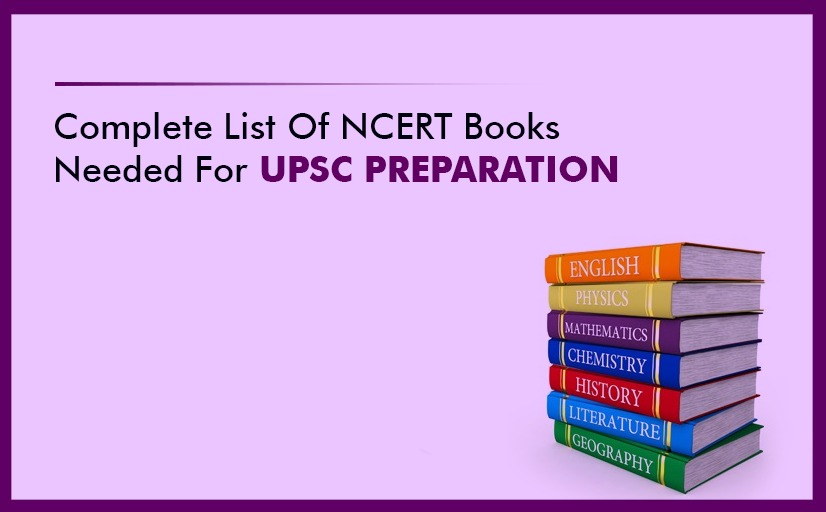NCERT books have proved to be highly beneficial for UPSC examinations. These are designed to cover the fundamental topics and help to cover the important topics for UPSC preparation.
NCERT content is concise and understandable. The authors have procured information from reliable sources, and the language makes it extremely easy to memorise and retain the information. To begin with UPSC preparation, it is always advised to start with the NCERTs first to grasp the concept of standard reference book chapters.
We have gathered all the essential NCERT books required to prepare for the UPSC examination. Stick to the end of the article as we share a few tips to prepare practical notes from the NCERT books.
Required NCERT books
Art and Culture
Art & Culture: NCERT Class XI – An Introduction to Indian Art
Art & Culture: NCERT Class XI – Living Craft Traditions of India (Chapters 9 & 10)
Economics
Economy: NCERT Class IX – Economics
Economy: NCERT Class X – Understanding Economic Development
Economy: NCERT Class XI – Indian Economic Development
Economy: NCERT Class XII – Introductory Microeconomics
Economy: NCERT Class XII – Introductory Macroeconomics
Geography
Geography: NCERT Class VI – The Earth Our Habitat
Geography: NCERT Class VII – Our Environment
Geography: NCERT Class VIII – Resource and Development
Geography: NCERT Class IX – Contemporary India – I
Geography: NCERT Class X – Contemporary India – II
Geography: NCERT Class XI – Fundamentals of Physical Geography
Geography: NCERT Class XI – India – Physical Environment
Geography: NCERT Class XII – Fundamentals of Human Geography
Geography: NCERT Class XII – India – People and Economy
History
History: NCERT Class VI – Our Past
History: NCERT Class VII – Our Past -I
History: NCERT Class VIII – Our Past II and III
History: NCERT Class IX – India and the Contemporary World – I
History: NCERT Class IX – India and the Contemporary World – II
History: NCERT Class X – Themes In World History
History: NCERT Class XII – Themes In Indian History – I
History: NCERT Class XII – Themes in Indian History – II
History: NCERT Class XII – Themes In Indian History – III
Indian Society
Indian Society: NCERT Class VI – Social Science: Social & Political Life I
Indian Society: NCERT Class VII – Social Science: Social & Political Life II
Indian Society: NCERT Class VIII – Social Science: Social & Political Life III
Indian Society: NCERT Class XI – Sociology: Understanding Society
Indian Society: NCERT Class XII – Indian Society
Indian Society: NCERT Class XII – Social Change and Development in India
History
History: NCERT Class VI – Our Past
History: NCERT Class VII – Our Past -I
History: NCERT Class VIII – Our Past II and III
History: NCERT Class IX – India and the Contemporary World – I
History: NCERT Class IX – India and the Contemporary World – II
History: NCERT Class X – Themes In World History
History: NCERT Class XII – Themes In Indian History – I
History: NCERT Class XII – Themes in Indian History – II
History: NCERT Class XII – Themes In Indian History – III
Polity
Polity: NCERT Class IX – Political Science: Democratic Politics Part – I
Polity: NCERT Class X – Political Science: Democratic Politics Part – II
Polity: NCERT Class XI – Political Science: Indian Constitution at Work
Polity: NCERT Class XI – Political Science: Political Theory
Polity: NCERT Class XII – Political Science I: Contemporary World Politics
Polity: NCERT Class XII – Political Science II: Politics in India since Independence
Science & Technology
Science: NCERT Class VI
Science: NCERT Class VII
Science: NCERT Class VIII
Science: NCERT Class IX
Science: NCERT Class X
Science: NCERT Class XI – Chemistry: Unit 14 & Biology: Units 4 & 5
Science: NCERT Class XII – Chemistry: Unit 16 & Biology: Units 8, 9 & 10
While studying from the NCERTs, studying the books subject-wise and jotting down the pivotal points as you go by is essential. You should set a fixed period in which you will complete reading the NCERT study materials.

